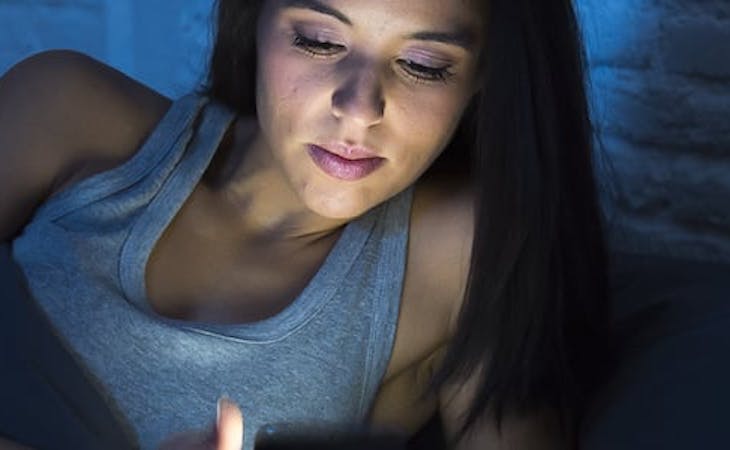While there are lots of things that can interfere with a good night’s sleep, one that’s been a particularly hot topic of conversation lately is blue light.
It turns out this is a warranted concern. We chatted with W. Christopher Winter, MD, sleep expert at Charlottesville Neurology and Sleep Medicine Center in Virginia, to find out more about blue light and how it can impact your sleeping schedule. We also got his expert tips for reducing blue light’s negative effect on sleep.
How blue light disrupts your sleep
Blue light is a short-wavelength light emitted from the screens of electronic devices, such as your smartphone and television. It stimulates cells in your retina, sending a signal to a part of your brain called the suprachiasmatic nucleus.
That, in turn, inhibits your pineal gland’s ability to produce melatonin, the hormone that makes you feel sleepy, Winter explains. Instead, light with blue-green content has the effect of making you feel more awake and alert.
According to Harvard Health Publishing, blue light exposure at night throws your body’s internal clock (aka circadian rhythm) out of whack. There’s even some research linking nighttime light exposure to diabetes and heart disease because it leads to interrupted sleep.
Reducing blue light effects
Below are some methods that have proven to be effective in limiting exposure to blue light.
Cut down on screen time before bed
Yes, we know: This is easier said than done. But one of the best ways to limit blue light exposure is to cut down on phone usage before bed.
“We usually recommend turning off one to two hours before bed,” says Winter. “Screen time in the morning, theoretically, would help someone feel awake,” so spend as much time as you want on your devices in the morning.
Wear blue light-blocking glasses
If you like reading before bed and you’ve already traded in all of your books for an e-reader, it may be time to invest in some blue light-blocking glasses.
“I think they are quite effective, provided they do, in fact, block blue light,” explains Winter. “I have tested many different pairs of glasses and have found many do not do what they are advertised as doing.”
To make sure you’re choosing effective blue light-blocking glasses, opt for ones with amber or orange lenses. Winter likes the ones from Uvex and Spectra.
Several studies have found proper blue light-blocking glasses are indeed effective at cutting down on blue light exposure, and researchers have noted less of a disruption in melatonin production in study participants.
Put your phone on night mode
This may be one of the easiest things you can do, and it can make a big difference.
One study found that even something as simple as adjusting the brightness on your phone can significantly decrease the amount of blue light emitted from your screens.
Use a blue light-filtering app
If adjusting the brightness on your phone causes your eyes to strain, consider downloading a blue light blocking app like f.lux for your computer or the Twilight Blue Light Filter for your phone.
Switch out your light bulbs
Blue light is also emitted from the lights in your house, as well as from your TV screen, so you may want to take those into account when considering how to best limit your exposure.
Start by switching out incandescent bulbs for ones that emit less blue light, like these Restful Bedtime Bulbs. Dyson even makes a lamp that will match with the light cycle outside, so that you’re never forcing your body past its natural cycle.
Finally, if you or your partner aren’t ready to get rid of the TV in your bedroom, Winter suggests putting it on a wall as far away from the bed as possible.
The bottom line: Regardless of which methods you implement, as long as you’re working toward reducing your overall exposure to blue light, you’re heading in the most restful direction.
Too stressed to sleep? Here are the best nighttime activities to help you relax.




